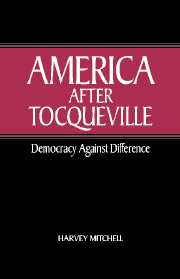10 - Conclusion
Published online by Cambridge University Press: 10 August 2009
Summary
Throughout this book, I have tried to find the right distance between our own time and Tocqueville's to reach a proper reckoning of the intellectual power of his theory and the accuracy of his observations. And, as I suggested at the beginning, democracy and modernity came to be uniquely identified with one another in America. Modernity embraces more than the forces of the capitalist market place. It rests on a scientific and technological edifice kept in place by bureaucracies of experts, in both government and in private corporations, who are dependent on networks of information and communication for even the simplest of exchanges. The broad and specific features of that edifice were in an infant stage in Tocqueville's time.
The economics of capitalism was, if not fully developed in Tocqueville's work, not an unimportant part of it. The close connection that he saw between individualism, self-interest, the hunger for material success, and the power of the state, on the one hand, and the combined forces of commerce and the expanding frontier that opened up opportunities and concentrated energies in unprecedented ways, on the other, did not yield a full-bodied critique of capitalism. He did not offer a systematic analysis capable of grasping its strong and fragile points. He had no broad economic vision of what was taking place and what might happen as it made its advance in the Western world.
- Type
- Chapter
- Information
- America after TocquevilleDemocracy against Difference, pp. 276 - 294Publisher: Cambridge University PressPrint publication year: 2002



